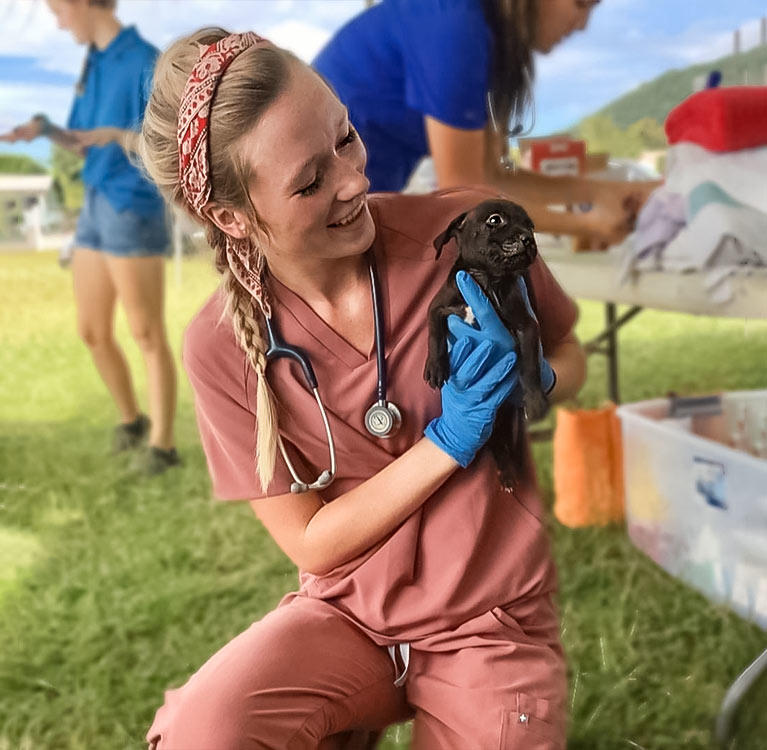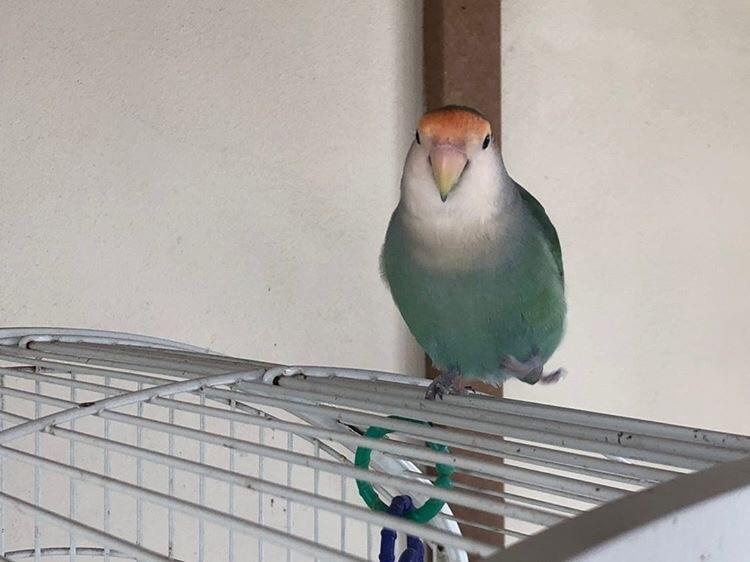As a good student and a person interested in both animals and science, you may have thought more than once about becoming a veterinarian. Maybe you’ve started taking personal inventory: what would it take, what are the required skills to be a veterinarian? What are the important things to know about being a veterinarian—before you start vet school? Read on to learn about the skills, abilities, and training needed to succeed in vet school, and find helpful information about being a veterinarian. Read on to see if you might have what it takes.
SKILLS NEEDED TO BE A VETERINARIAN
A veterinarian is a medical professional who protects the health and welfare of animals and people. Veterinarians diagnose and treat sick animals, prevent the spread of animal diseases to humans, and advise owners on the care of their animals. Some vets are involved with wildlife preservation efforts, some work to maintain the health of food animals, and others conduct laboratory research to understand more about disease and develop new treatments. But what does it take to be a vet? To practice as a veterinarian, you will need to earn a Doctor of Veterinary Medicine (DVM) degree from a school accredited by the American Veterinary Medical Association (AVMA) such as Ross University School of Veterinary Medicine*. Vet school programs typically last around four years and the curriculum is designed to prepare you for success as a vet. Most programs offer clinical experience in laboratories and animal hospitals to give you hands-on training using the skills needed to be a veterinarian. Many vet students seek internships and residencies to further hone their skills.
Before you can apply to veterinary school, you need to tailor your undergraduate studies to give you the fundamentals needed to study veterinary medicine. Most vet schools have a list of prerequisite courses you must take before you can be considered for admission. Ross Vet requires prospective students to take university courses in the following subjects:
- Biology
- Cell biology or Genetics
- Chemistry
- Biochemistry
- Physics
- Mathematics
- English
Ross Vet also requires prospective students to complete electives from the humanities and social sciences, including at least one of the following: comparative anatomy, medical terminology, microbiology, nutrition, physiology, Spanish (or other foreign language), public speaking, or introduction to business.
Another important thing to know about being a veterinarian is that you may be required to take the Graduate Record Examination® (GRE®) as part of the entrance requirements for veterinary school. This test evaluates your verbal reasoning, quantitative reasoning, and analytical writing skills. The GRE is challenging, but training courses and practice exams can help you study. Some vet schools require the Biology GRE or the Medical College Admission Test® (MCAT®)—check your school’s admission requirements for specifics.
In addition to academic success, veterinary schools require students to work hundreds of hours with animals before they are admitted to study veterinary medicine. If you’re thinking of becoming a veterinarian, start getting experience working with animals early. Consider working or interning at a veterinary clinic, shelter, or animal hospital. Aquariums, farms, stables, and zoos are other places you might look for practical experience. The hours spent in such places can help you learn what veterinarians do, give you hands-on experience, allow you to work as part of a team, and help you create a network of veterinary medicine professionals. The practice you get in these circumstances can help you to develop the skills needed to be a veterinarian, and the contacts you make may prove helpful when you need to secure your letters of recommendation when applying to vet school. You may even meet a potential mentor who can give you guidance as you pursue a career in veterinary medicine.
WHAT TO KNOW BEFORE STARTING YOUR JOURNEY TO BECOMING A VET
One of the other more important things to know about being a veterinarian is that you need people and communication skills. Veterinary medicine is not just about working with animals, it’s also about working with people. Communication is a major skill needed to be a veterinarian. Animals can’t tell you what’s wrong with them—an owner will be the one to tell you her horse has been acting differently than normal, for example. Once you have diagnosed a problem and decided on a treatment care, you will have to explain that to the human owner, not the animal. Therefore, you need to be good at communicating with people, understanding their needs, and explaining veterinary issues to them so they can care properly for their animal.
The ability to remain calm under pressure and adapt your approach in the moment is another skill needed to be a veterinarian. A frightened cat might escape your exam room, spooking a dog in the waiting area, whose bark alarms nearby birds and hamsters. You will need to be ready for the unexpected when working with animals, and you’ll need to instinctively call on your veterinary knowledge to quickly remedy situations.
Prospective veterinary students should also consider taking business classes. According to AVMA statistics, in 2020 more than 60 percent of veterinarians in the United States run their own business by working in private practice with companion animals exclusively. They may own a clinic, hospital, laboratory, or other veterinary facility. Having business skills, then, can be very important for a veterinarian.
Now that you know the answer to the question “what does it take to be a vet?” and are knowledgeable about important things to know about being a veterinarian, take the next step and apply to Ross Vet today!
Related links:
- What Is A Veterinarian?
- What Do Veterinarians Do?
- How To Become A Veterinarian
- How To Get Into Vet School?
- Ross Vet School Admission Requirements
*Ross University School of Veterinary Medicine confers a Doctor of Veterinary Medicine (DVM) degree, which is accredited by the American Veterinary Medical Association Council on Education (AVMA COE), 1931 N. Meacham Road, Suite 100, Schaumburg, IL 60173, Tel: 800.248.2862. For more information please visit
https://www.avma.org/education/accreditation-veterinary-colleges
The AVMA COE uses defined standards to evaluate veterinary medical education programs, including facilities, clinical resources, curriculum, faculty, student outcomes and research programs. The standards are interpreted and applied by the AVMA COE-accredited veterinary medical education programs in relation to its mission.






